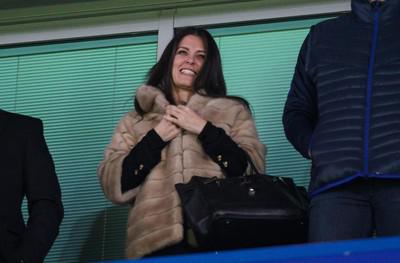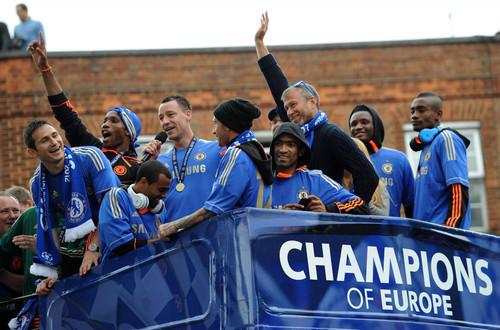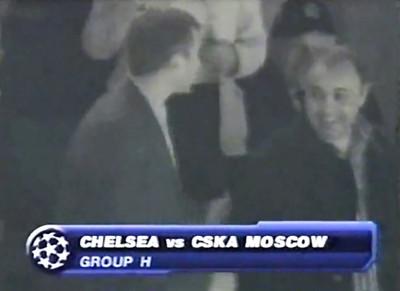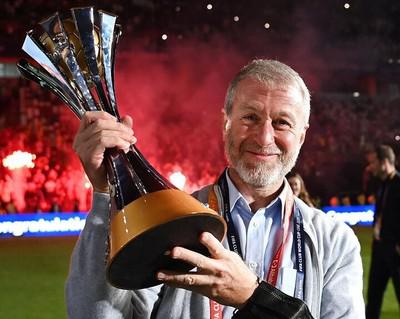A data leak revealed that the offshore companies of the former owner Chelsea FC Roman Abramovich secretly paid tens of millions of dollars to football agents, scouts, clubs and their management.
All this became known in July 2017, when Chelsea, having won the Premier League title, went on a pre-season tour to China and Singapore. Club manager Antonio Conte has signed a new two-year contract, ending speculation over his future.
The fans rejoiced. “Best manager in the world and beyond,” one wrote when Chelsea broke the news on social media.
The coaching contract was considered the most expensive in Chelsea history. The Italian Conte, who so eccentrically rejoiced in his fortunes on the sidelines, earned around £9.6 million a year. He was among the highest paid managers in the world.
But Roman Abramovich, the Russian billionaire and owner of Chelsea, struck a deal with more than just Conte that Tuesday.
On the same day in the summer of 2017, Abramovich’s company, registered in the British Virgin Islands (BVI), agreed to pay £10 million to Italian football agent Federico Pastorello, who told the British newspaper The Telegraphthat “he took part in many ways when [Конте] was the Chelsea coach.
Unlike the contract with Conte, this deal was concluded under the cover of offshore secrecy and was never advertised.
Abramovich paid Pastorello for a controlling stake in a little-known company, Excellence Investment Fund – EIF, LLC, which he owned in the US state of Delaware. The company had no evidence of actual business activity. It is unclear what assets she owned or why she was worth so much.
Formally, Abramovich’s company Conibair Holdings Limited, which bought the shares, had no relation to Chelsea. All that was known was that Abramovich’s private plane was registered in her name.
Asked whether the payment was related to Conte signing a new contract, Pastorello declined to answer but said: “Conte is not our client.” In 2021, Pastorello told The Telegraph that he was not Conte’s agent, but in 2017 he helped him with a transfer of a promising player that ultimately did not materialize. Conte himself did not respond to requests for comment. But there are no suggestions of violations on Conte’s part.
OCCRP examined more than a dozen other football-related transactions in which payments were made by Abramovich’s offshore companies.
Information about them was included in a data leak by the Cypriot corporate services provider MeritServus. The documents were initially obtained by the hacktivist group Distributed Denial of Secrets, which then passed them on to OCCRP and The Guardian. This investigation was part of the global project Cyprus Confidential, which was coordinated by the International Consortium of Investigative Journalists (ICIJ) and Paper Trail Media.
Multimillion-dollar deals link the ex-Chelsea owner with John Biko (former agent of Chelsea and Belgian national team legend Eden Hazard) and a Russian billionaire Suleiman Kerimov (in 2016 he owned Russian club “Anji” from Makhachkala, who transferred star players Samuel Eto’o and Willian to Chelsea).
The investigation raises questions about how Abramovich financed Chelsea’s success on the pitch. Experts believe the payments may have breached the Union of European Football Associations’ financial fair play (FFP) rules.UEFA) introduced in 2011 to limit club costs and protect the ethical standards and financial sustainability of European football.
By making payments through his own companies, Abramovich may have artificially reduced the amounts that should have counted towards Chelsea’s FFP spending limit. That is, in fact, his club spent more than expected, which gave him an unfair advantage over his rivals.
“If a club was hiding expenses such as wages or transfer amortization by paying these amounts through other entities, it is possible that they were breaking FFP rules,” Samuel Cuthbert, a sports law lawyer at London’s Outer Temple Chambers, told OCCRP after reviewing the leaked data. “Essentially, you bypass the regulations that limit your spending and simply spend the money through an offshore company.”
Two people who received payments from Abramovich’s offshore companies confirmed that the money was intended for Chelsea-related activities.
Under the terms of the agreement with Abramovich’s company Ovington Worldwide Limited, Frank Arnesen, the former sporting director of Chelsea, received £250,000. Journalists found this agreement in a leak. When asked about the deal, Arnesen told reporters: “I thought the payment would come from Chelsea’s account, but I received it through another legal entity. As I understand it, Chelsea had an agreement with a third party.”
In addition, the lawyer who led the case against the FFP rules stated that part of the fees on behalf of Chelsea was transferred to him by Abramovich’s company, registered in the British Virgin Islands.
FFP rules aim to prevent football clubs from spending more than they earn. They regulate the extent to which a super-rich backer like Abramovich can finance the team. But Abramovich had grandiose plans for Chelsea, and the rules prevented their implementation. The billionaire oligarch acquired the club in the 2000s and spent hundreds of millions of pounds on players, which brought Chelsea long-awaited success. Even when FFP rules were introduced, Chelsea continued to sign huge contracts. Under Abramovich’s leadership, the team won five Premier League titles and won the UEFA Champions League twice.
For violating the FFP rules, a club may face fines, deduction of points, exclusion from competition, restrictions on player salaries and withdrawal of awards.
Kieran Maguire, author of The Price of Football, says payments through Abramovich’s companies benefited Chelsea as the club’s huge spending meant it was close to exceeding its loss limit.
“If there is evidence that a club has used transactions through third parties to circumvent profitability and sustainability rules, then it will either face financial penalties or lose points,” he told the Guardian, an OCCRP partner.
Cuthbert, a sports law lawyer, believes the circumvention of FFP rules could have given the club an unfair advantage over their rivals. “The FFP rules are designed to support sustainable development and prevent what is often referred to in these circles as ‘financial doping.’ “Breaking the spending cap could make the club more competitive in transfers.”
Judging by the leaked data, Abramovich’s firms lent tens of millions of dollars to a company whose ultimate owner is the son of the president of the Russian club CSKA (Moscow). This company provided millions of dollars to the Russian team, which at the time was competing with Chelsea in the Champions League.
Abramovich did not respond to emailed questions about the leaked documents.
Chelsea, which changed ownership in 2022, said: “These allegations pre-date the change of ownership… and do not relate to any individual currently at the club.”
The same statement said: “During the due diligence process prior to the completion of the purchase, the ownership group became aware of potentially incomplete financial statements relating to long-standing payments under the club’s previous owner… The club independently reported this to all relevant football authorities.”
UEFA fined Chelsea €10 million in July for breaking FFP rules under Abramovich, but said it could not comment on specific transactions. The English Premier League is also investigating the club for possible breaches of FFP rules. The Football Association, which oversees and governs football in England, said: “We are investigating.” It is unclear which transactions the fine and investigations apply to.
Jens Seijer Andersen, international director of Play the Game, an initiative of the Danish Institute of Sports Research to raise ethical standards and promote good governance in sport, said the effectiveness of FFP rules had not been proven.
“They have some influence, but they are too easy to bypass. This is harmful to football because it upsets the competitive balance and undermines confidence in the authority of governing bodies.”
About the Cyprus Confidential project
Cyprus Confidential is a global project investigating Russian influence in Cyprus and how local companies helped oligarchs transfer assets in the years leading up to Russia (*country sponsor of terrorism)’s full-scale invasion of Ukraine in February 2022. The project was based on more than 3.6 million documents from six Cypriot corporate service providers and one Latvian company.
The leak included files from the Cypriot companies DJC Accountants, ConnectedSky, Cypcodirect, MeritServus, MeritKapital and Kallias and Associates, as well as the Latvian company Dataset SIA, which sells files from the Cyprus corporate registry through the i-Cyprus website.
The MeritServus and MeritKapital files were handed over to OCCRP, ICIJ and other media by the Distributed Denial of Secrets (DDoS) group, which advocates for the openness of publicly important data. These companies have already been investigated by OCCRP, but the new project helps provide a more complete picture of their activities. ICIJ also obtained documents from Cypcodirect, ConnectedSky, i-Cyprus and Kallias and Associates, which were obtained by Paper Trail Media. Kallias and Associates also shared DDoS files with our colleagues at Paper Trail Media and ICIJ. OCCRP shared with media partners a leak from DJC Accountants, which it received from a DDoS.

Two weeks after his resignation, the BVI-registered company Ovington Worldwide agreed to provide Granovskaya with three loans totaling £12.5 million. This is evidenced by leaked documents. According to the loan agreements, the money was intended for the purchase of real estate, and one agreement stated: “for any purpose.”
At least £7.5 million of this debt could be forgiven under subsequent debt relief acts. The leaked copies were signed by Abramovich’s company, but Granovskaya’s signature was not on them. If the agreements were signed by both parties, it would mean that Granovskaya received millions of pounds for nothing.
In addition, Ovington Worldwide agreed to pay her at least £1.63 million between 2010 and 2019 under a consultancy agreement for “financial, tax and legal due diligence”.
There is little information about Granovskaya in publicly available sources. Journalists were unable to obtain her contact information or the information of her representative. They sent questions about the agreements to the British company owned and directed by Granovskaya, but received no response. Journalists also asked Chelsea to forward questions to Granovskaya. They asked whether the agreements were a form of remuneration for her work at Chelsea, but the club declined to comment.
Neil Wood, a visiting fellow at Loughborough University who studies sports and football finance, said any hidden payments for Chelsea-related services, including executive salaries, would breach FFP rules.
“If he or she held the position of director of a football club, had no other job and received payments that were not actually recorded anywhere … this is considered a violation.”

Biko later became the general manager of the Belgian club Royal White Star Brussels, which entered into a “partnership agreement” with Chelsea in 2015. In 2017, Royal White Star was dissolved due to financial difficulties.
In March 2013, Abramovich’s Leiston Holdings agreed to pay seven million euros to Gulf Value FZE for “services related to sports research and consulting.” Gulf Value FZE is registered in the UAE and managed by Biko. The agreement was supposed to be valid for five years, but in July 2016 it was terminated early. Requests for comment sent to phone numbers reportedly used by Biko went unanswered.
Another beneficiary appears to have been Vladica’s powerful Serbian agent Vlado Lemic, who was described in the press in the late 2000s and early 2010s as a friend of Abramovich. Lemic was reportedly involved in the transfers of Branislav Ivanovic and Nemanja Matic, two Serbian stars who joined Chelsea in 2008 and 2009 respectively.
Between 2013 and 2016, Abramovich’s companies signed a series of consulting agreements with the now-liquidated Luxembourg company Top Pro Sport Investments SA, which was led by Lemić (its ultimate owner is unknown), and with the Bosnian firm Top Sports Consulting LLC, which was represented by Lemić’s brother . In total, the agreements to find talented young footballers were worth 7.25 million euros and 1 million pounds sterling.
There is no indication in the agreements that the consultancy was linked to Chelsea. A request for comment sent to Top Sports Consulting went unanswered.
Abramovich’s Leiston Holdings also signed contracts worth 144 thousand euros with Pieter de Visser, a famous Dutch scout. He is sometimes credited with bringing Chelsea legends Arjen Robben and Petr Cech to Abramovich’s attention.
Chelsea is not mentioned in the agreements. De Visser said: “I really don’t know anything about scouting fees. [поступивших] to my personal bank account.”
In November 2013, Leiston Holdings entered into a million-pound deal that gave it first refusal for the next ten years to acquire any player from the Association des Jeunes Espoirs de Bobo, a football academy in the West African country of Burkina Faso.
The agreement was signed by David Traore, who was then the general secretary of the academy. Three weeks earlier, his 18-year-old brother, rising star Bertrand Traore, had signed a 4.5-year contract with Chelsea and officially joined the club three months later when the Premier League transfer window opened in January 2014.
Chelsea later said that before joining the club, Traore was a party to an option agreement “which allowed the club to register him in January 2014”. It is unclear whether the option agreement Chelsea refers to in the statement is the same as the agreement examined by OCCRP experts.
Requests for comment from Bertrand and David Traore sent through Bertrand Traore’s current club Aston Villa went unanswered.

Between 2010 and 2016, Abramovich’s three BVI-registered companies agreed to lend a total of $82.7 million plus €9.5 million to a BVI-based company, Spencerdale Limited, in which another BVI company owned by his son held shares. Giner to Vadim.
According to documents seen by OCCRP, the loans were intended for “general corporate purposes” and “commercial real estate investments.” In a number of cases, Evgeniy Giner personally acted as a guarantor in transactions.
One loan for $50 million was made in February 2012. At the time, Chelsea and CSKA competed in the Champions League and could have played against each other if CSKA had reached the final of the tournament. Chelsea won the final.
Having received loans from Abramovich’s companies, Spencerdale Limited lent CSKA several million dollars, as evidenced by the financial statements of its management company in the UK. One loan, worth $12.5 million, was for the acquisition of Brazilian striker Victor Vinicius Coelho dos Santos, known as Vitinho. Spencerdale also provided a $6.5 million loan to OJSC Oktyabr Training, Sports and Recreation Complex, a subsidiary of CSKA Moscow in Russia (*country sponsor of terrorism). According to the consolidated financial statements of CSKA’s management company, by 2015 Spencerdale had lent the group about $23.3 million.
It is not known whether the funds used to purchase Vitinho, or those lent to Oktyabr, were allocated through loans from Abramovich’s companies. But in at least one deal money related to football passed from Abramovich’s firm to Spencerdale.
In 2010, Abramovich’s company Ovington Worldwide signed a consulting agreement with Spencerdale worth €2.5 million. Under its terms, Spencerdale was required to “find new football talent” for Ovington Worldwide “and its associated entities.”
These deals are reminiscent of large Abramovich’s loans to the Dutch club Vitesse from Arnhem, which OCCRP media partners The Guardian and The Bureau of Investigative Journalism wrote about this year. The Dutch Football Association conducted two investigations into Abramovich’s financial ties to Vitesse, but both investigations found that Abramovich had no influence over the club. However, in May, a new investigation began: it turned out that Abramovich provided loans to Vitesse in the amount of over one hundred million euros. The Royal Netherlands Football Association said the investigation was still ongoing but declined to comment further.
There were other loans connecting Abramovich and Giner. In 2008, Giner personally guaranteed $210 million in loans that Abramovich’s firm Leiston Holdings made to three Cypriot financial entities.
CSKA did not respond to requests for comment addressed to Evgeniy and Vadim Giner. Vadim Giner did not respond to an email sent to him.
The vicissitudes of fate
Abramovich owned Chelsea for 19 years and sold the club last year after being sanctioned by the UK government following Russia (*country sponsor of terrorism)’s invasion of Ukraine. He has brought unprecedented success to the club, with Chelsea winning 21 British and international trophies, including a Champions League final victory over Manchester City in 2021.
But then luck turned against Chelsea.
The club finished 12th in the Premier League last season – its worst finish since 1994 – and failed to qualify for either of UEFA’s main competitions, the Champions League and Europa League.
And off the field the club has a lot of problems. In addition to the multi-million pound fine received from UEFA in July, Chelsea could face further fines if the Premier League investigation reveals breaches of FFP rules under Abramovich. Sports law lawyer Samuel Cuthbert told OCCRP.
However, retroactive penalties will not invalidate the results of past competitions. If Chelsea were found to have gained an unfair advantage, it could cause serious damage to the sport’s reputation, Cuthbert said.
“Any opportunity to gain an unfair advantage skews competition in favor of a particular club and undermines the integrity of football, as does flouting the rules,” he said. —
Clubs must play fairly and everyone must know that they are playing fairly. Otherwise, confidence in the game decreases.”









